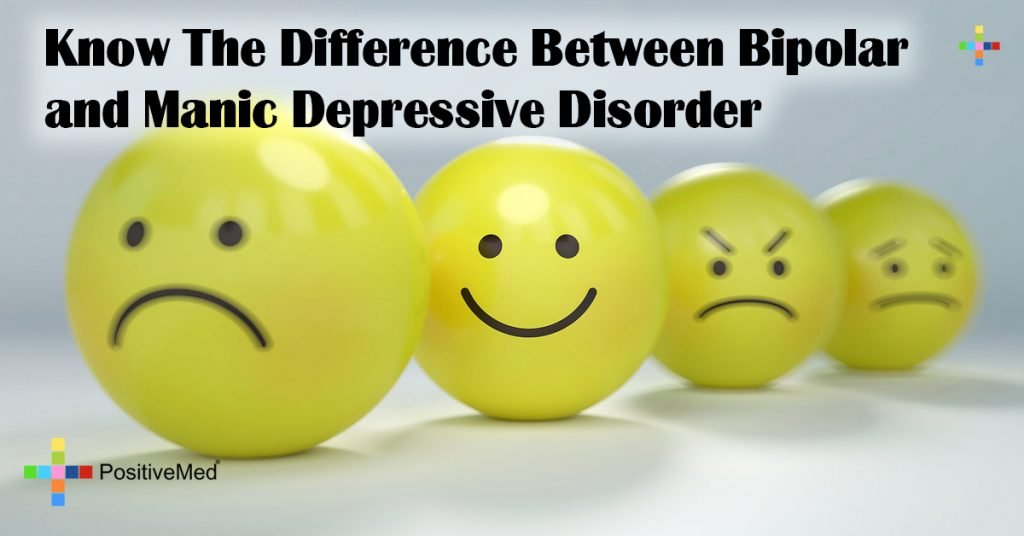
Know The Difference Between Bipolar and Manic Depressive Disorder
[nextpage title=”…”]
Many people are confused about the difference between the terms “bipolar”, “depression”, and “manic depression”. All of these terms refer to mental illnesses, but bipolar and manic depression refer to the same illness.

Bipolar and Manic Depression
The field of psychiatry changed the term for manic depression to bipolar many years ago to distinguish manic depression from clinical depression. Clinical depression is a mental illness characterized by the following symptoms:
– Feeling sad and unhappy for an uninterrupted period of at least two weeks
– Crying for no reason
– Feeling worthless
– Having very little energy
– Losing interest in pleasurable activities
Bipolar is characterized by alternating moods of mania and depression. What is a manic episode?
– Feeling overly happy, excited, or confident
– Feeling extremely irritable or aggressive
– Having racing thoughts or speech
– Thoughts of being overly important, gifted, or special
– Making poor judgments with respect to money or relationships
– Engaging in risky behavior
RELATED ARTICLE: 7 Things Everyone Gets Wrong About Bipolar Disorder
Hypomania is a lesser form of mania where you might experience only a few of these symptoms or experience them with a low intensity. People with the more severe form of the illness are diagnosed with Type 1 Bipolar Disorder. Those who have hypomanic instead of full blown manic episodes are said to have Type 2 Bipolar Disorder.
So, the difference between depression and manic depression is that manic depression has alternating periods of mania and depression while depression is just straight depression. They changed the name of manic depression to bipolar so that there would no longer be any confusion between the two illnesses.
Treatments for the Two Disorders
The treatments of the two disorders are also different. Both illnesses respond to medication and therapy, but the medication used for each is different. Bipolar responds to mood stabilizers and atypical antipsychotics. Nowadays, mood stabilizers have largely been supplanted by atypical antipsychotics.
Mood stabilizers include drugs such as lithium. The newer atypical antipsychotics, such as Abilify, tend to be very expensive now.
[/nextpage] [nextpage title=”…”]
The medications used for clinical depression are antidepressants. These drugs include Cymbalta and Wellbutrin. Antidepressants are also used in combination with other drugs for bipolar. However, there is always the fear that an antidepressant will put a person with bipolar into a manic state. Therefore, it is always used for bipolar with extreme caution.
Bipolar and ADHD
Depression isn’t the only illness that is confused with bipolar disorder. Attention deficit disorder is also confused with it. Sometimes there are mistakes between them of misdiagnosis.
Causes of Bipolar Disorder
The cause of bipolar disorder is not entirely known. Researchers think that there are a number of factors including genetic, neurochemical and environmental ones. The current theory is that it is a neurobiological disorder that is caused by an imbalance of brain chemicals. Three brain chemicals, known as neurotransmitters, have been implicated. These are serotonin, dopamine, and noradrenaline.
Genetic Factors in Bipolar Disorder
Genetic factors seem to play a role in bipolar disorder. The illness runs in families. Also, twin studies have been done. Research on identical twins shows that if one twin is diagnosed with the illness, then it raises the risk for the other twin to also be diagnosed by between 40 and 70 percent. More research needs to be done, however, to confirm these facts.
Environmental factors seem to be triggers in people who have a genetic predisposition for the illness. A bad breakup or a death of a close relative can many times trigger a bipolar episode.
In conclusion, bipolar and manic depression are the same illness. The reason that there are two names is simply that there was a confusion between clinical depression and manic depression. Bipolar is a neurobiological disorder that can nowadays be treated with medication and therapy. There is no cure for the illness now, but many people lead productive lives while suffering from the illness.
[/nextpage]





